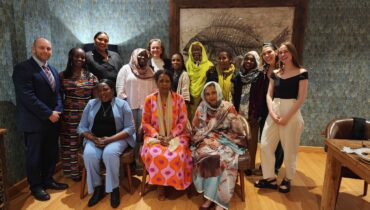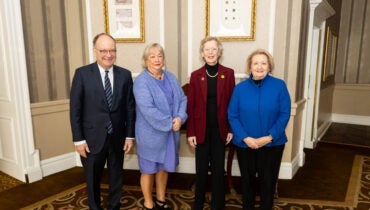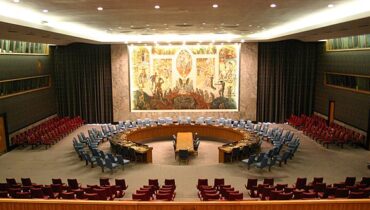Originally posted on the global.gender.current blog here.
On April 5, the Georgetown Institute of Women, Peace, and Securityhosted a panel discussion on “Enhancing Accountability for Women, Peace and Security: Maximizing Synergies Between CEDAW and the Women, Peace and Security Resolutions.” The three panelists were Dr. Catherine O’Rourke, a Senior Lecturer in Human Rights and International Law with the Transitional Justice Institute at Ulster University; Dr. Aisling Swaine, of GW, Associate Professor of Practice of International Affairs in the Elliott School of International Affairs; and Ms. Alison Davidian, a Transitional Justice Policy Specialist on the Peace and Security Team with UN Women. The three experts explored the state of the field regarding women in the peace and security arena and offered suggestions for the future.
Dr. Aisling Swaine began the discussion with a broad overview of the issue of women and conflict, starting with the assertion that women and girls have specific rights and needs in contexts of conflict and peacemaking. There has been a history of exclusion of these needs, and women’s organizations have lobbied for their inclusion. CEDAW, adopted in 1979, was the first document to look at women’s rights, and it includes a built-in accountability mechanism with the CEDAW Committee, a team of 23 gender equality experts from around the world who review states’ progress toward implementation of the treaty. However, CEDAW is often forgotten about during times of conflict.
The second area where women’s rights in conflict have been discussed is within the UN Security Council (UNSC), with the Women, Peace, and Security resolutions (WPS). These resolutions set out to develop a normative framework for women’s rights in conflict. Starting with resolution 1325, subsequent resolutions afterwards have called for increasing the number of women peacekeepers, gender mainstreaming in peacekeeping missions, and increasing the number of women in leadership positions. States are asked to implement National Action Plans (NAPs), however the implementation and reinforcement of the WPS resolutions is weak, Dr. Swaine asserted. Additionally, there is very little synergy between CEDAW and the resolutions. Of 988 resolutions since the year 2000, when the Council took up the WPS agenda, only 10 resolutions mention CEDAW.
Next, Dr. Catherine O’Rouke explored how CEDAW is working to address the lack of implementation during conflict with General Recommendation 30(GR30). GR30 articulates how the rights guaranteed by CEDAW apply in conflict prevention, conflict, and post-conflict settings. The Committee identified the need to improve scrutiny of states dealing with conflict, and with GR30, address states in their domestic and international activities, donor activities, and their membership in multilateral organizations.
Dr. O’Rouke stated that the recommendation takes the convention as a starting point and is always grounded in the rights of the convention. It acknowledges the Women, Peace, and Security framework and asks that all NAPs be complaint with the CEDAW convention. It also encourages states to collaborate with civil society. GR30 utilizes a stronger accountability mechanism than the WPS resolutions, requiring states to report every four years on their implementation of the convention. States must report specifically on how their laws, policies, and programs ensure human rights in and out of their territories and in bilateral efforts. Dr. O’Rouke asserted that since the adoption of GR30, there has been more accountability on issues of women, peace, and security, with special attention paid to women’s participation in peace processes.
Lastly, Ms. Alison Davidian discussed these frameworks moving forward. She identified UNSC resolution 2242 as an important addition to the WPS resolutions. The resolution establishes an informal experts group on WPS, which will provide a monthly examination and analysis on how the WPS resolutions are being implemented in that country. The resolution also included strong language on taking a gender approach to countering violence extremism (CVE) and called for an analysis on how CVE and terrorism are impacting the rights of women.
Ms. Davidian identified three key areas for increasing accountability of GR30 and the WPS resolutions. First, for countries under review of the CEDAW Committee, the Committee should pay special attention to GR30. Second, the Committee should encourage shadow reports, or reports by civil society organizations, on the WPS obligation. Lastly, the Committee should expand special reporting and hold special sessions to look at the obligation of states to uphold CEDAW and WPS during conflict and post-conflict. Moving forward, UN women encourages CEDAW members to use GR30 in dialogue with states.
The event concluded with questions from the audience regarding militaries and the frameworks, CVE, and the role of regional organizations in implementing these agendas.
For more information on GR30 and WPS, view the UN Women guidebook written by Dr. Swaine and Dr. O’Rouke.
About the Author
Lesli Davis joined the Global Gender Program in 2015 as the Program Officer for Women’s Empowerment Pakistan, a university partnership between GW and Lahore College for Women University. Lesli received her undergraduate degree in English and Sociology from the University of Tennessee, Knoxville. After university, she worked in domestic refugee resettlement as an ESL teacher, health caseworker, and finally as case manager. She also founded the Knoxville chapter of the Young Nonprofit Professionals Network. Currently, Lesli is pursuing an MA in International Affairs with a focus on global gender policy and international organizations and law. Lesli is also the research assistant for GGP faculty affiliate, Professor Aisling Swaine. As the Program Officer, Lesli assists with event planning, grant reporting, and administrative tasks, among other duties.


